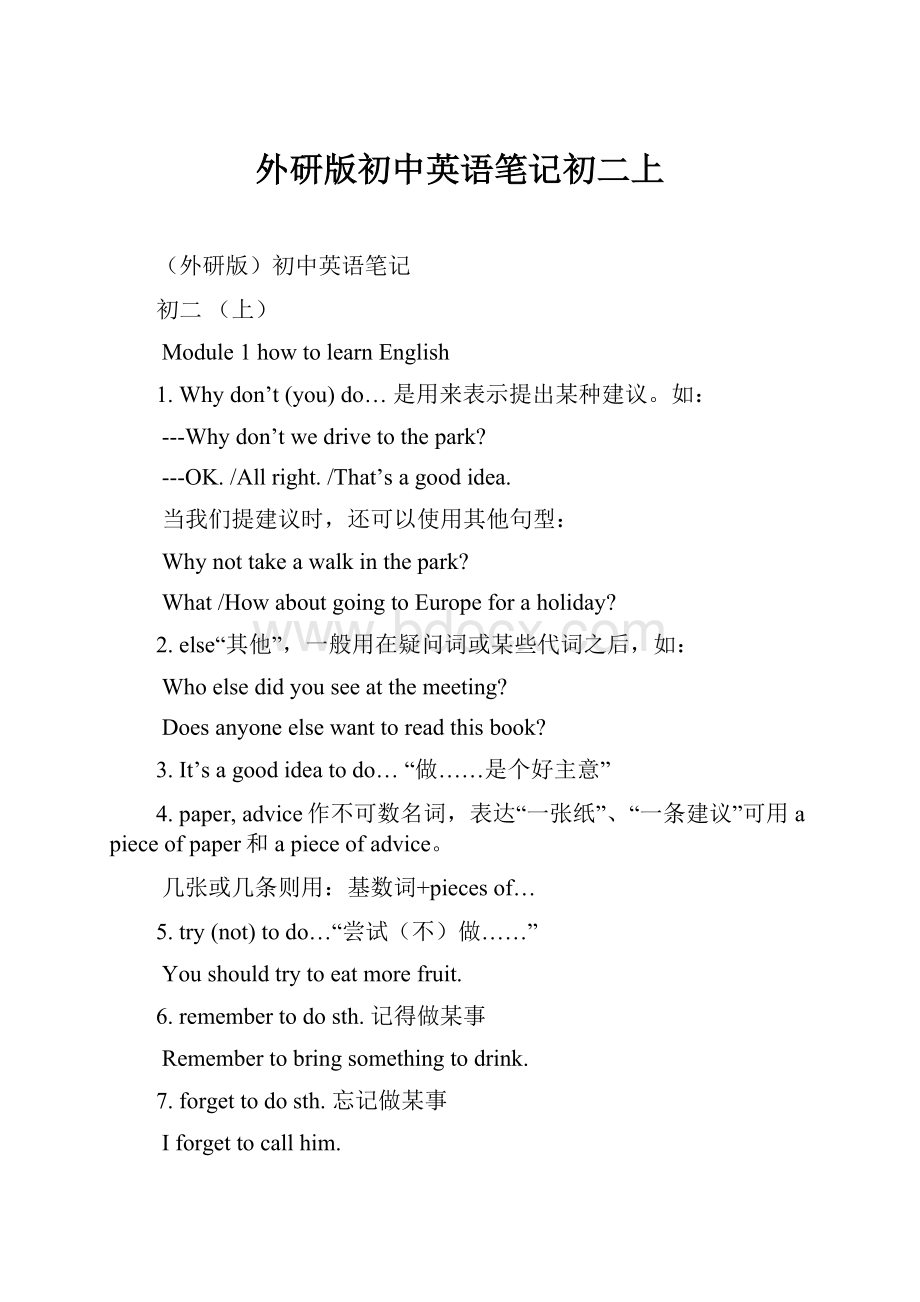外研版初中英语笔记初二上.docx
《外研版初中英语笔记初二上.docx》由会员分享,可在线阅读,更多相关《外研版初中英语笔记初二上.docx(12页珍藏版)》请在冰豆网上搜索。

外研版初中英语笔记初二上
(外研版)初中英语笔记
初二(上)
Module1howtolearnEnglish
1.Whydon’t(you)do…是用来表示提出某种建议。
如:
---Whydon’twedrivetothepark?
---OK./Allright./That’sagoodidea.
当我们提建议时,还可以使用其他句型:
Whynottakeawalkinthepark?
What/HowaboutgoingtoEuropeforaholiday?
2.else“其他”,一般用在疑问词或某些代词之后,如:
Whoelsedidyouseeatthemeeting?
Doesanyoneelsewanttoreadthisbook?
3.It’sagoodideatodo…“做……是个好主意”
4.paper,advice作不可数名词,表达“一张纸”、“一条建议”可用apieceofpaper和apieceofadvice。
几张或几条则用:
基数词+piecesof…
5.try(not)todo…“尝试(不)做……”
Youshouldtrytoeatmorefruit.
6.remembertodosth.记得做某事
Remembertobringsomethingtodrink.
7.forgettodosth.忘记做某事
Iforgettocallhim.
8.asksb.(not)todosth.要求某人(不)做某事。
Theteacheraskedustocometoschoolontime.
9.enjoyoneself=haveagoodtime=havefun玩得愉快
Module2experiences
1.现在完成时⑴⑵⑶:
have/has+动词的过去分词
㈠①用于表示在以前的某个时间曾经做过的、发生的事情,这种行为对目前有某种影响;②还可以表示到目前为止曾经经历或没经历的事情;③要表达某一行为或某一状态从过去某一时间一直持续到现在,也可用现在完成时表示。
如:
Ihaveseenthefilm.Idon’twanttoseeitagain.
IhavenevervisitedtheUSA.
IhavelivedinBeijingfor10years.
㈡常与现在完成时连用的时间状语:
yet,never,ever(用于疑问句或否定句中);
already,just,recently(用于肯定句中)。
They’rejustheardamessagefromaspaceraft.
㈢对一段时间的提问:
howlong…
回答:
since+时间点或for+一段时间
---HowlonghaveyoulivedinBeijing?
---Since2008./Forfouryears.
㈣在现在完成时中,点动词(非延续性动词)一般不与表示延续的时间状语连用。
非延续性动词
延续性动词
非延续性动词
延续性动词
comeback
beback
leave
beaway
buy
have
learn
know
borrow
keep
puton
wear
die
bedead
marry
bemarry
Iborrowedthebookthreeweeksago.改为:
Ihavekeptthebookforthreeweeks.
㈤点动词的谓语动词是否定形式,则可与表示一段时间的for短语连用。
如:
Myparentshaven’tseenmefortwoyears.
㈥过去分词的变化形式大部分与动词的过去式形式相同,但不规则动词的变化无规律,如:
see—saw—seen,send—sent—sent,
be—was/were—been,break—broke—broken,
keep—kept—kept,have/has—had—had,
buy–bought—bought,make—made—made,
go–went—gone,do–did—done.
2.①havebeenin“一直呆在某个地方”,与时间状语连用。
TheyhavebeeninBeijingfortwoweeks.
②havebeento“去过某地,已经回来”。
---HaveyoueverbeentoLondon?
---Yes,Ihave./No,Ihaven’t.
③hasgoneto“去了某地,还没回来”,常用于第三人称。
MyfatherhasgonetoWuhan,andhe’llbebackthisweekend.
Module3journeytospace无
Module4education
1.geton(well)withsb./sth.“和……相处(融洽)”或“……进展(好)”。
Hedoesn’tgetonwellwithhisparents.
2.eight-year-old为合成形容词,一般要用连字符连接起来,而且,year也不用复数形式。
如:
an80-pagebook一本80页的书
athree-roomapartment三室的套房
3.withthehelpof表示“在……的帮助下;借助于”。
如:
Theyworkedoutthemathsproblemwiththehelpoftheteacher.
4.because“因为”,后接从句;
becauseof“因为”,后接名词或名词短语。
Hedidn’tgototheparkbecauseitrained.
Hedidn’tgototheparkbecauseoftherain.
5.lookafter=takecareof“照顾”
Whowilllookafterthebaby?
6.payfor“支付”
7.borrowfrom“从……借来……”;len
Module5westernmusic
1.①反意疑问句:
助动词/系动词be+主语(代词)
它的构成是前肯后否,前否后肯。
---Youaren’tateacher,areyou?
你不是老师吧?
---Ohyes,Iamateacher.不,我是老师。
---Hedidn’tcometothemeeting,didhe?
他没来开会,是吧?
---No,hedidn’t.对,他没来。
②陈述句部分有否定意义的词,反意疑问句要用肯定式。
如:
never,noone,few,little,hardly,nothing…
2.“使某人怎么样”:
makesb.dosth.
makesb.+形容词
Sadfilmsalwaysmakemecry.
HiswaltzsmadehimfamousalloverEurope.
3.notonly…butalso“不仅……而且……”
Shenotonlysang,butalsodanced.
Module6afamousstory
1.①过去进行时:
was/were+v.-ing
一般来说,表示在过去某一时间正在发生的动作,都可以用过去进行时。
如:
Ididn’thearthephone.MyfatherwaswatchingTVthen.
②常与过去进行时连用的时间状语:
atthetime,atfiveyesterday,then,atthistimeyesterday,
lastnight,thewholemorning…
2.what…for?
=why?
为什么。
如:
Whatdowegotoschoolfor?
Whydowegotoschool?
3.bedoing…when…表示一个动作在进行,另一个动作又发生了。
如:
Theywereworkinginthefieldswhenitbegantorain.
4.inthetree表示人、鸟等外来物在树上;
onthetree表示花、果实长在树上。
5.smileat…对……微笑。
6.get+形容词:
“变得”
Theweatherisgettingcold.
7.复合不定代词:
something,nothing,everything,anything……
如果形容词修饰这些复合不定代词,形容词置于后面。
如:
nothingstrange
8.动词不定式todo作后置定语时,可修饰复合不定代词。
如:
nothingtodo
9.seesb.dosth.看见某人做了某事(习惯性或经常性)
seesb.doingsth.看见某人正在做某事(正在做)
如:
Isawsheenterthehouse.
Isawheplayingbasketball.
(类似的有hear,feel,watch,notice.)
10.①goacross=cross“穿过”,强调穿过某一平面(田野、桥等)。
②through从某一空间内穿过。
(门gate、深林forest)
③past从某事物的一旁经过
④over从平面的一边到另一边或越过某个高度
⑤along/down表示沿着(街道、河流等)
11.not…until直到……才
12.toomany+可数名词“太多”,toomanypeople
toomuch+不可数名词“太多”,toomuchmusic
muchtoo+形容词“太……”muchtoohot
13.havetodosth.必须做某事
Ihadtostayathometolookafterher.
14.too…to/…enoughto“太……而不能”
Theboyistooyoungtogotoschool.
Theboyisn’toldenoughtogoschool.
Module7feelingandimpressions
1.表感觉和知觉的系动词:
feel,look,touch,smell,sound,taste…
后接形容词。
Doesthepartysoundnoisy?
Thecakedoesn’ttastedelicious.
Helooksangry.
Theshirtfeelssoft.
2.①hearfrom收到……的来信。
宾语为人
Wehaven’theardfromherforages.Howwemissher.
“收到……的来信”还可这样表达:
get/receivealetterformsb.
②hearof/hearabout听说;听到
3.Whatdoessb.looklike?
询问外貌
4.⑴beafraid+从句“害怕……”
I’mafraidthatyoucan’tgowithme.
⑵beafraidtodosth.“害怕做某事”(没有勇气,不敢做)
Hewasafraidtogooutaloneatnight.
⑶beafraidofdoing…“害怕做某事”(害怕某事发生在自己头上,有可能发生,也有可能不发生)
Heisafraidoffallingintotheriver.
⑷beafraidofsb./sth.害怕某人某事。
I’mnotafraidofyou.
5.①beproudof…为……而自豪
Herparentsareproudofher.
②beproudtodo…为做某事而感到自豪
6.be/getangrywithsb.生某人的气
Igotangrywithmyself.
7.agreewithsb./sth.赞同某人某事
8.can’twaittodosth.迫不及待地想做某事
Thefanscan’twaittoseetheirfavoritepopstar.
9.“也”。
①too用于口语(肯定句中),置于句末,用“,”隔开。
Nicetomeetyou,too.
②either用于否定句中。
Shecan’tspeakChineseandherhusbandcan’t,either.
③also用于实义动词之前,系动词、情态动词、助动词之后。
Heisalsoasinger.
④aswell用于肯定句句末。
Shecandanceandshecansingaswell.
10.aren’tbeing…arebeing不是……而是……
Theyaren’tbeingfriendly—theyarepolite.
11.thanks/thankyoufor+n./v-ing.感谢…….
Thankyouforlovelypresent.
Thankyouforcoming.
12.abit与alittle“有点”
同:
abit/alittle+adj./adv.
异:
alittle+不可数名词:
alittlemilk
abitof+不可数名词:
abitofmilk
Module8aroundtown
1.①方位表达方式,常用的方位介词:
ontheleft/right在左边/右边
nextto与……紧挨着
opposite在……对面
onthecornerof在……拐角处
between…and…在……和……之间
inthemiddleof在……中间
crossing十字路口
②例句:
Thebankisnexttothemarket.
Thesupermarketisoppositetherestaurant.
Takethethirdturningontheleft.
Module9animalsindanger
1.动词不定式㈠㈡㈢:
(可作主语、宾语、补语、表语、状语、定语)
结构为“(not)to+动词原形”(有时可不带to)。
Toseeistobelieve.//Itisagoodideatobringyourcamera.
Iwanttohaveadrink.
Shetoldmetobuyaticket.
Ourdutytodayiscleanthefloor.
Hegotupearlytocatchthefirstbus.
Ihavealotofhomeworktodo.
2.常见的动词不定式的语用功能:
⑴后接to+动词原形作宾语的有:
want,hope,plan,decide,try,agree,offer,like,love…多表示将来的行为。
如;
Itriedtounderstandthewords,.
⑵itis…todosth.做某事怎么样
It’sgoodtogetupearlyinthemorning.
⑶sb.be+形容词+todo…表示某人对某件事情的态度。
Iwassurprisedtohearthatnews.
⑷sth.be+形容词+todo…表某一事物的某种属性。
Theseapplesarenotgoodtoeat.
………………………….
3.indanger处于险境;处于危险之中
Thegirlisveryillandherlifeisindanger.
4.takeaway把……带走;减去
Ifyoutake4awayfrom12,youget8.
5.liveon以……为生;(靠吃……)维持生命。
Sheepliveongrass.
6.alongwaytogo路还很长;还需要努力。
I’vegotthefirstprize.ButIknowI’vegotalongwaytogo.
7.比较级+and+比较级:
越来越……
longerandlonger
8.①enough做形容词,“充足的;足够的”,在句中做定语或表语,做定语时放在修饰词之前。
Wehaveenoughtimetofinishthework.
②enough做副词时,修饰形容词、副词或动词,放在修饰词之后。
Areyouwarmenoughinsuchalightjacket?
9.suchas与forexample“例如”,前者用于举多个例子,无逗号隔开。
如:
Manyanimalsindangersuchastigers,whales,turtles.
Module10LaoSheTeahouse
1.双宾语:
①“动词+人+物”或“动词+物+to/for+人”,
其中,人称为间接宾语,物为直接宾语。
如:
Mybrotherboughtmesomestorybooks.
Mybrotherboughtsomestorybooksforme.
②常见的接双宾语的动词:
give,bring,lend,send,show,leave,buy,tell,teach,sell…
③for表示“为某人”;如:
buysb.sth.=buysth.forsb.
cooksb.sth.=cooksth.forsb.
readsb.sth.=readsth.forsb.
…………………………….
④to表示“给某人”;如:
givesb.sth.=givesth.tosb.
(其他bring,lend,hand,send,show,leave,teach,sell,offer…)
2.introducesb./sth.tosb.向某人介绍……
CanyouintroduceyourselftousinEnglish?
3.takeplace发生
4.giveawelcome欢迎
Module11theweather
1.情态动词may/might:
表示一般将来的可能性,might的可能性比may的可能性小。
如:
Bringyourswimsuitbecauseyoumightwanttoswiminthesea.
ImaygotoEnglandoneday.
2.其他表形容词和副词:
Itispossiblethat…
Itispossibletodosth.
主语+willprobably/possibly+v.
(probably的可能性比possibly的可能性大)
3.hadbetterdosth.最好做某事。
bettergetgoing相当于hadbettergo“最好现在去/走”
4.takephotosof…“给……拍照”
Shetookalotofphotosofthekids.
5.fromtimetotime=sometimes有时
6.表天气名词+y结尾构成其形容词形式。
如:
cloud—cloudy,rain—rainy,snow—snowy,
wind—windy,sun—sunny,fog—foggy,
Module12traditionallife
1.情态动词must,can
must表示“必须做某事”,含主观看法。
mustn’t表示“禁止做某事”。
---MustIgetupearly?
---Yes,youmust.
---No,youneedn’t./No,youdon’thaveto.
can表示允许;
can’t表示“不能;不要”,即不允许。
Youcangoandseetheliondance.
---MayIopenthewindow?
---Yes,youmay./No,youcan’t.
2.accept与receive“收到”,receive表收到但不一定接受。
如:
Shereceivedapresent,butshedidn’tacceptit.
3.bedifferentfrom与……不同
BirthsEnglishisdifferentfromAmericanEnglish.
4.shakehandswithsb.与某人握手